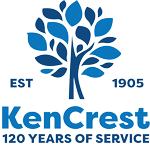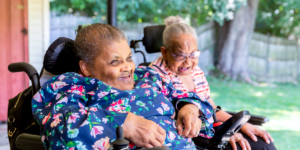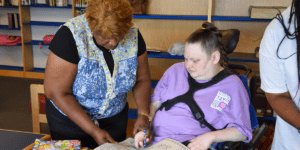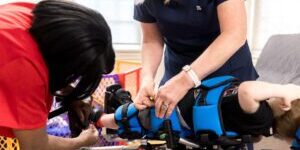When Radojka came to KenCrest's Adult Community Living Homes in 2016, she had a voice, just not one that many around her could understand. A 65-year-old Bosnian native who speaks Serbian, Radojka was eager to communicate with her support team, but the language barrier often left her feeling isolated and misunderstood.
Still, her desire to connect never wavered. Over time, staff members began picking up fragments of her language, learning to communicate through gestures, patterns, and mutual patience. “I listened closely and realized that some of the words she was saying more often than others in her language, she would also say in English,” says Tia Gibbs, the Assistant Director for Region 2.
Despite their efforts, clear communication remained a challenge. Staff often relied on phone-based translation apps or formal translators during appointments and ISP meetings. Day-to-day conversations, however, were left to guesswork and hope.
That changed six months ago, when a conversation between Kellie Smith, the Director of Operational Supports for Community Collaborative, and Gregg Kelinson, the Vice President of Quality & Innovation, in the Enabling Technology department sparked a powerful idea: what if Radojka had access to a real-time translator that could speak with her, not just for her?
They introduced the AI translator Model S85 Pro, a handheld device programmed by Kelinson to recognize and translate speech between English and Serbian. With help from Gibbs, the device was delivered to Radojka, who immediately lit up with excitement.

For the first time, she could communicate with her staff confidently, without having to rely on guesswork. “She was excited to know that staff could understand her better,” says Gibbs. “She was also excited about understanding the staff better. At some point, she would play with staff and say things to throw them off and laugh about it; she has quite the sense of humor.”
Now, when Radojka wants to talk, she simply reaches for the device. No frustration or confusion. Just conversation.
The impact was quickly noticed by those outside of Radojka’s social circle. During a recent CQL Accreditation visit, Radojka confidently demonstrated the translator in action, helping KenCrest showcase its commitment to inclusive support practices. “She actually enjoyed the presentation,” says Gibbs. “I communicated with her before it and explained what we were doing; she took it very seriously, and when it was our time to present, she did very well.”

What started as one act of innovation is now a growing initiative. Thirty translators are currently in circulation across KenCrest. Fifteen of these devices are now helping Direct Support Professionals communicate more effectively with their supervisors, building stronger teams and more inclusive environments.
Looking ahead, KenCrest plans to pilot Alexa-enabled devices to provide even more voice-activated supports. There are also plans to open a second Smart Home in Philadelphia, expanding access to enabling technologies for individuals closer to that area.
As for Radojka, the transformation has been life-changing, not just for her, but for the people who care for her.
“I feel so happy for her,” says Gibbs. “Her brother always wanted her to learn English. But instead, we found a way to meet her where she is, and give her a way to be heard.”
At KenCrest, we believe that everyone deserves the dignity of being understood. Through creative solutions and compassionate care, we’re building a future where every voice matters, no matter the language.










